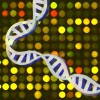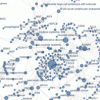Posts tagged genomics

Harnessing the power of bioinformatics in cancer research
Nov 22nd
One of the biggest challenges facing cancer researchers is that the disease varies so much from person to person. Even the same type of cancer – lung, brain, breast, colon, and so on – can be subtly different. This means that a therapy that works well in one patient may have no effect in another.
So researchers in the UK brought in the big guns – bioinformatics.
Cancer Research UK has set up seven British centers to start collecting 9,000 tumor samples from a wide range of cancer patients to create a DNA database. Researchers will extract DNA from these tumors and More >

Origin of ALS discovered
Oct 24th
ALS (amyotrophic lateral schlerosis, a.k.a. Lou Gehrig’s disease) is a devastating disease which kills motor neurons, leaving patients paralyzed and unable to function. Although patients remain aware and for the most part mentally undamaged, most patients die within 2-3 of onset as the disease progressively leaves them trapped in a body that is unable to function. As motor neurons die, the person’s muscles weaken and atrophy, and patients will eventually develop respiratory difficulties leading to death.
Unfortunately very little is known about how this disease develops, so a new breakthrough published in Neuron (and by a second group also in Neuron) is More >

Cancer Genomics: so many mutations!
Feb 18th
The human genome is the complete collection of over three billion bases in each of our cells. Cancers accumulate multiple changes, or mutations, in their DNA that contribute to the disease by changing how cells behave. For instance, cancers need nutrients to grow. Very often, they get these nutrients by producing signals that encourage new blood vessel formation. Finding the mutations that lead to cancer is very difficult. For one thing, even for cancers that affect the same tissue and look similar, the mutations can be very different. Also, one of the hallmarks of cancer is an increased rate of More >

Pharmacowhat? Pharmacogenetics!
Oct 15th
Your genes affect not only how you look and your predisposition to disease, but it would appear that they also affect your responsiveness to different drug treatments following disease onset.
In the emerging field of pharmacogenetics, scientists study genome variations and correlate them with drug treatment response. For example, variations (also called polymorphisms) in genes encoding enzymes involved in drug metabolism have been found to affect the activation, deactivation, and toxicity of drugs used to treat cancer, heart disease, and psychiatric disorders. Recently, scientists found that DNA sequence can also be used to predict responsiveness to current Hepatitis C treatment (a More >

Psychosis – New Study Links Gene Variant to Brain Structures
May 12th
A study published in last week’s Science magazine shows how genomic science and neuroimaging can be combined to deliver insights into cognitive disorders. As well as providing an intriguing look into the neurobiology of psychosis, the study reflects a growing trend toward inter-disciplinary research in the neurosciences,
What did the study show?
Psychosis is a disordered cognitive state that can include disorganized thoughts, delusions, or hallucinations. It is a common symptom of schizophrenia and has been linked to a number of brain areas, including the the dorsolateral prefrontal cortex (DLPFC) and the hippocampus. Schizophrenia is also strongly associated with a number of genes, and More >
